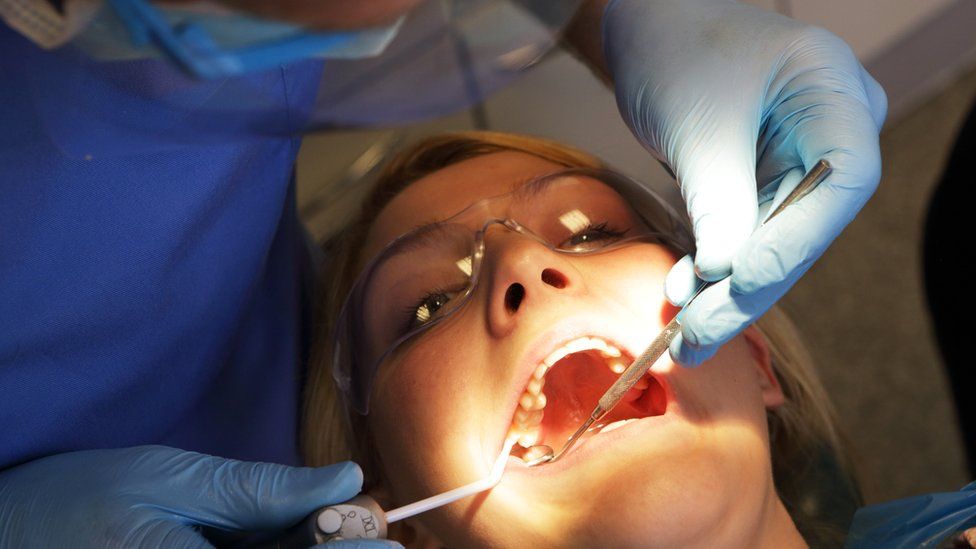Getty ImagesBy Nick TriggleHealth correspondentPaying dental practices 25% more to see patients would help keep dentists in the NHS, the profession’s leaders say.The British Dental Association said increasing the activity rate from £28 to £35 in England would be just enough to stem the flow of dentists to the private sector in the short term.They warned government plans set out in February did not go far enough.But ministers defended the reforms and said they were working on a wider overhaul of the whole dental contract.They said the measures set out in the dental reform plan last month had already increased payments as well as introducing premium rates to take on new patients and a £20,000 golden hello for dentists to work in the areas with the worst access.Dentist shortages to be tackled with cash incentiveDriving hundreds of miles for dentist ‘unacceptable’A BBC investigation in 2022 found nine in 10 NHS dental practices across the UK were not accepting new adult patients for treatment on the NHS.It found the lack of NHS appointments had led people to drive hundreds of miles in search of treatment, pull out their own teeth without anaesthesia or resort to making their own improvised dentures.While the number of NHS treatments has started to rise, it is still below pre-pandemic levels.Dental practices are paid what is called a unit of dental activity (UDA) rate.Basic check-ups are classed as one UDA while complex work, such as bridges, crowns and dentures, is classed as 12 UDAs.In evidence to the House of Commons’ Health Committee, BDA leader Shawn Charlwood said: “We aren’t being greedy. It is completely affordable. You simply cannot recruit at the low UDA rate.”The BDA said the higher payments would be used to increase the wages of staff, including dentists, nurses and therapists, rather than leading to more profit for dentists that own the practices.Mr Charlwood said he believed increasing the rate would have a “significant impact” but it could only be an interim measures as an overhaul of the dental contract was needed.Thea Stein, of the Nuffield Trust think-tank, said retention of the workforce was a major issue and agreed the government plans still did not go far enough and would leave the sector “grappling” with the problems it was facing.But health minister Andrea Leadsom said the measures that were being put in place under the dental reform plan should help incentivise dentists to stay in the NHS.But she added: “We will be monitoring [the impact] carefully.”She said the government was already working towards a more substantial reform of the dental contract to address recruitment in the longer term.Related TopicsDentistryHealthRelated Internet LinksBritish Dental AssociationHealth and Social Care CommitteeThe BBC is not responsible for the content of external sites. …
Article Attribution | Read More at Article Source
[mwai_chat context=”Let’s have a discussion about this article:nnGetty ImagesBy Nick TriggleHealth correspondentPaying dental practices 25% more to see patients would help keep dentists in the NHS, the profession’s leaders say.The British Dental Association said increasing the activity rate from £28 to £35 in England would be just enough to stem the flow of dentists to the private sector in the short term.They warned government plans set out in February did not go far enough.But ministers defended the reforms and said they were working on a wider overhaul of the whole dental contract.They said the measures set out in the dental reform plan last month had already increased payments as well as introducing premium rates to take on new patients and a £20,000 golden hello for dentists to work in the areas with the worst access.Dentist shortages to be tackled with cash incentiveDriving hundreds of miles for dentist ‘unacceptable’A BBC investigation in 2022 found nine in 10 NHS dental practices across the UK were not accepting new adult patients for treatment on the NHS.It found the lack of NHS appointments had led people to drive hundreds of miles in search of treatment, pull out their own teeth without anaesthesia or resort to making their own improvised dentures.While the number of NHS treatments has started to rise, it is still below pre-pandemic levels.Dental practices are paid what is called a unit of dental activity (UDA) rate.Basic check-ups are classed as one UDA while complex work, such as bridges, crowns and dentures, is classed as 12 UDAs.In evidence to the House of Commons’ Health Committee, BDA leader Shawn Charlwood said: “We aren’t being greedy. It is completely affordable. You simply cannot recruit at the low UDA rate.”The BDA said the higher payments would be used to increase the wages of staff, including dentists, nurses and therapists, rather than leading to more profit for dentists that own the practices.Mr Charlwood said he believed increasing the rate would have a “significant impact” but it could only be an interim measures as an overhaul of the dental contract was needed.Thea Stein, of the Nuffield Trust think-tank, said retention of the workforce was a major issue and agreed the government plans still did not go far enough and would leave the sector “grappling” with the problems it was facing.But health minister Andrea Leadsom said the measures that were being put in place under the dental reform plan should help incentivise dentists to stay in the NHS.But she added: “We will be monitoring [the impact] carefully.”She said the government was already working towards a more substantial reform of the dental contract to address recruitment in the longer term.Related TopicsDentistryHealthRelated Internet LinksBritish Dental AssociationHealth and Social Care CommitteeThe BBC is not responsible for the content of external sites. …nnDiscussion:nn” ai_name=”RocketNews AI: ” start_sentence=”Can I tell you more about this article?” text_input_placeholder=”Type ‘Yes'”]

